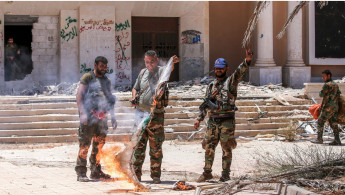Assad regime forces capture southern Syrian region from Islamic State
Syrian regime forces Saturday took back control of the Islamic State group's last holdout in southern Syria after months of fighting, a war monitor said.
Regime forces retook Tulul al-Safa, between the provinces of Damascus and Sweida, "after IS fighters withdrew from it and headed east into the Badia desert", the Britain-based Syrian Observatory for Human Rights said.
Regime forces have been fighting the militants in the area since a deadly July attack on the Druze minority in Sweida province.
In recent weeks, air strikes on the Tulul al-Safa pocket had increased and hundreds of regime fighters were sent as reinforcements, the Observatory said.
The militants' withdrawal was likely "under a deal with the regime forces" after weeks of encirclement and air raids, Observatory chief Rami Abdel Rahman said.
State news agency SANA reported regime forces had made "a great advance in Tulul al-Safa" and said they were combing the area for any remaining jihadists.
In the July 25 attack, IS killed more than 250 people, most of them civilians, in a wave of suicide bombings, shootings, and stabbings across Sweida province.
The jihadists also kidnapped around 30 people -- mostly women and children -- during the deadliest assault on Syria's Druze community in the seven-year civil war.
Twenty-three of the hostages have since returned home, while the remainder appear to have died or been executed by the jihadists.
The province is the heartland of the country's Druze minority, which made up roughly three percent of Syria's pre-war population -- or about 700,000 people.
Followers of a secretive offshoot of Islam, the Druze are considered heretics by the extremists of IS.
IS overran large swathes of Syria and neighbouring Iraq in 2014, proclaiming a "caliphate" in land it controlled.
But the militant group has since lost most of it to various offensives in both countries.
Syria's conflict and the Assad regime
The Syrian conflict began when the Baath regime, in power since 1963 and led by President Bashar al-Assad, responded with military force to peaceful protests demanding democratic reforms during the Arab Spring wave of uprisings, triggering an armed rebellion fuelled by mass defections from the Syrian army.
Hundreds of thousands of civilians have been killed in the war, mostly by the regime and its powerful allies, and millions have been displaced both inside and outside of Syria.
The brutal tactics pursued mainly by the regime, which have included the use of chemical weapons, sieges, mass executions and torture against civilians have led to war crimes investigations.





 Follow the Middle East's top stories in English at The New Arab on Google News
Follow the Middle East's top stories in English at The New Arab on Google News
![The UAE is widely suspected of arming the RSF militia [Getty]](/sites/default/files/styles/image_330x185/public/2024-11/GettyImages-472529908.jpg?h=69f2b9d0&itok=Yauw3YTG)
![Netanyahu furiously denounced the ICC [Getty]](/sites/default/files/styles/image_330x185/public/2024-11/GettyImages-2169352575.jpg?h=199d8c1f&itok=-vRiruf5)
![Both Hamas and the Palestinian Authority welcomed the ICC arrest warrants [Getty]](/sites/default/files/styles/image_330x185/public/2024-11/GettyImages-2178351173.jpg?h=199d8c1f&itok=TV858iVg)